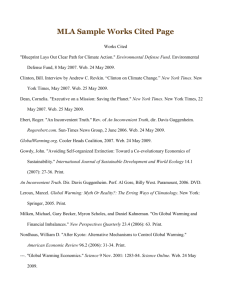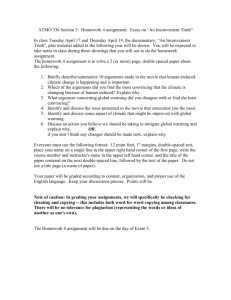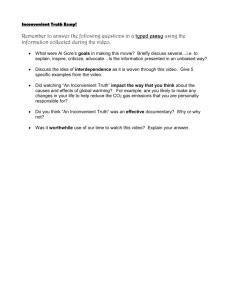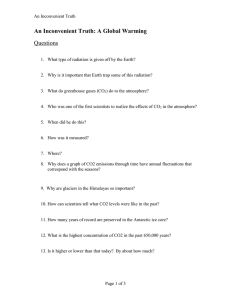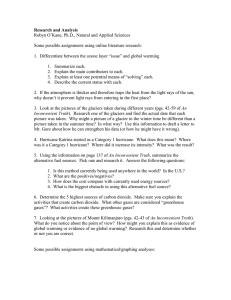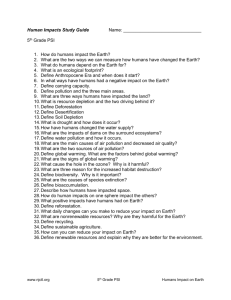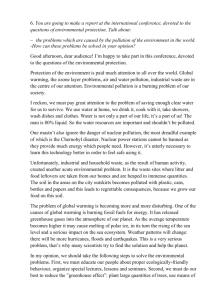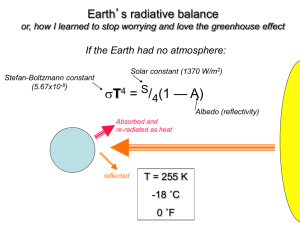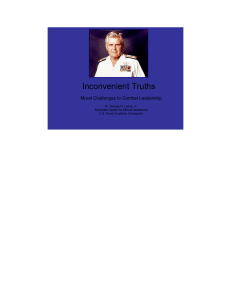Environmental Crisis: Sociology Presentation on Global Warming
advertisement
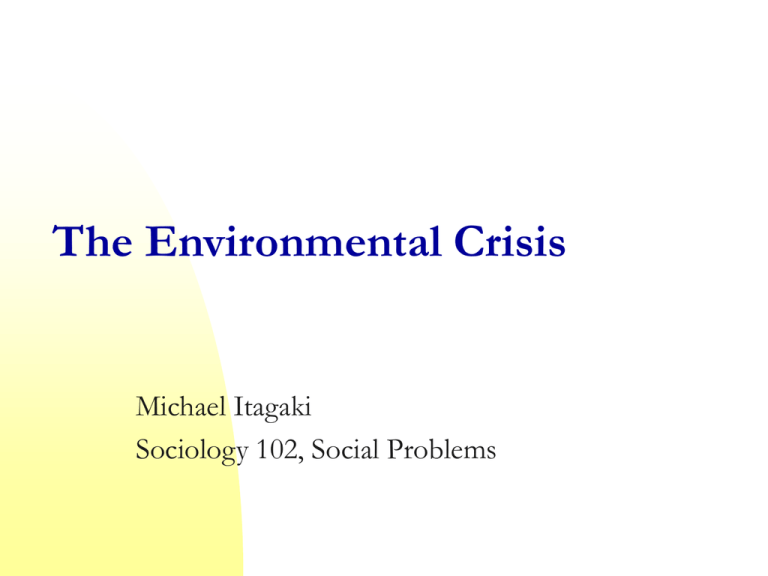
The Environmental Crisis Michael Itagaki Sociology 102, Social Problems The Environment: Global Warming/Climate Change “An Inconvenient Truth” Rising carbon dioxide levels Correspond with rising temperatures Ramifications? Water: stronger storms/drought Artic/Greenland: sea level Climate: ecological niches The Environment: Global Warming “An Inconvenient Truth” Handout: 10 things to do, online We have technology/resources to reduce our CO2 output and thus slow global warming process. The Environment: Global Warming “An Inconvenient Truth” What was a surprising/shocking fact in the film? What can we do? Discussion: “An Inconvenient Truth” Confronted with these issues How does it make you feel about our planet? What are some practical things we can do? The Environment: Global Warming “An Inconvenient Truth” Intergovernmental Increase Panel on Climate Change in temperatures caused by greenhouse gases Temperature and sea levels will rise regardless Sea levels will likely rise 7”-23” The Environment: Global Warming “An Inconvenient Truth” Caveats to consider CO2 influence temperature? Temperature influence CO2 ? Both The Environment: Global Warming “An Inconvenient Truth” So what do you want to do? Informed decisions Do you believe you can make a difference? The Problem in Sociological Perspective On-going destruction of our environment Prehistoric times: Burn forests Mesopotamia: River irrigation Mayans: Clearing of trees, soil erosion The Problem in Sociological Perspective Parable of the tragedy of the commons (p. 457) Is our world’s “pasture” limited? A rationalization to continue our own selfdestructive behavior? The Scope of the Problem Global scope of environmental problem Interconnectedness “An Inconvenient Truth” The Scope of the Problem Pollution Accumulation in air, water, land of substances harmful to living things Presence of substances that interfere with socially desired uses of air, water, land or food Social definition of pollution: What people say and believe is pollution The Scope of the Problem Pollution Pollutants introduced at exponential rate Earth’s finite capacity to absorb pollutants Long delay between introduction of pollutant and indication of harm to environment Symbolic Interactionism How did the environment become a social problem? Conservation movement Symbolic Interactionism How did the environment become a social problem? Conservation movement Shift to environmental concern Professionals/interest groups Government agencies News media Public Symbolic Interactionism Ecosystem Interconnected system on the earth Now, how do we connect to future? Functionalism Global System: Interconnectedness Ecosystem: Living organism Dysfunctions of Industrialization Conflict Theory Environmental Groups vs. Polluters Greenpeace, National Wildlife Federation Industrial, corporate entities “Corporate Welfare” (p. 463) Power of U.S. Industry Environmental injustice Research Findings Air Pollution Fossil fuels Waste incineration Autos/electricity PCBs Flourocarbon gases Damage to ozone expected to be repaired Research Findings Global warming Potential effects (p. 465) Difference of opinion (Henslin) One claim: Increase in CO2 will lower sea levels More CO2 will increase plant growth? National Academy of Sciences confirms threat of greenhouse effect Discussion: “An Inconvenient Truth” Confronted with these issues How does it make you feel about our planet? What are some practical things we can do?
